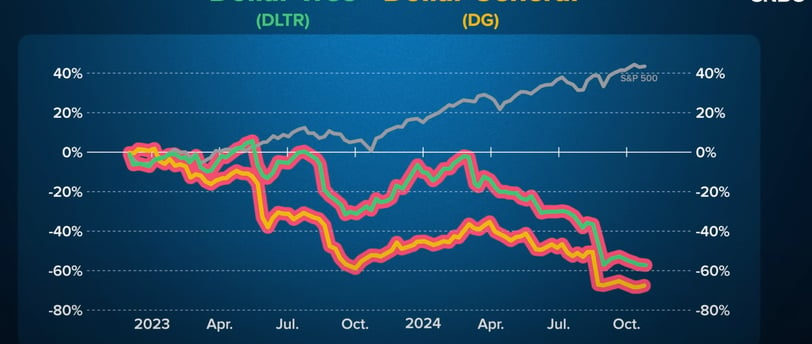Navigating Challenges: Dollar Tree and Family Dollar in a Competitive Landscape
11/11/20243 min read


Challenges in Supply Chain and Inventory Management at Dollar Tree and Family Dollar
introduction:
Dollar Tree and Family Dollar, two major players in the discount retail market, have faced significant challenges in recent years, particularly in their supply chain operations and inventory management systems. These struggles have been further exacerbated by competition from Dollar General, which has managed to outperform them by leveraging superior supply chain strategies and modernized systems. As the 2024 presidential election looms, a potential return of tariffs under a Trump administration could further impact these companies, highlighting the urgent need for operational improvements.
---
Challenges Faced by Dollar Tree and Family Dollar
1. Outdated Inventory Management Systems
- Dollar Tree and Family Dollar rely on legacy inventory software that lacks the capability to provide real-time data on stock levels and consumer preferences.
- This inefficiency leads to frequent stockouts and overstocking, resulting in lost sales and increased costs.
2. Supply Chain Inefficiencies
- Poor demand forecasting and vendor management cause delays in product deliveries and increased transportation costs.
- Limited flexibility to adapt to market changes further disrupts their supply chain.
3. Rising Operational Costs
- Labor shortages and rising wages have strained operational budgets, limiting their ability to invest in necessary technological upgrades.
- Increasing logistics costs, particularly in last-mile delivery, add to the financial burden.
4. Competition from Dollar General
- Dollar General has implemented advanced supply chain management systems, including automated warehouses and data analytics for inventory optimization.
- Its focus on rural markets and efficient logistics has allowed it to maintain a competitive edge and generate higher profit margins.
---
Impact of a Potential 2024 Trump Presidency
1. Tariff Implications
- A Trump presidency could mean the return of higher tariffs on goods imported from China, which constitutes a significant portion of inventory for dollar stores.
- Tariffs would increase the cost of goods sold (COGS), forcing Dollar Tree and Family Dollar to either absorb the costs, reducing profit margins, or pass them on to consumers, potentially losing price-sensitive customers.
2. Supply Chain Disruptions
- Tariffs may lead to sourcing challenges, as these companies rely heavily on low-cost imports.
- Finding alternative suppliers in other regions could require significant time and investment, further straining operations.
3. Competitive Disadvantage
- Dollar General’s preparedness and diversified supply chain could allow it to adapt more quickly to tariff changes, further widening the performance gap.
---
Lessons from Dollar General
1. Investment in Technology
- Dollar General’s integration of advanced inventory management systems provides real-time insights into stock levels and consumer trends, enabling better decision-making.
2. Focus on Supply Chain Optimization
- The company’s use of regional distribution centers and optimized logistics reduces transportation costs and ensures timely product availability.
3. Strategic Market Positioning
- Dollar General minimizes competition and capitalizes on customer loyalty by focusing on underserved rural markets.
Recommendations for Dollar Tree and Family Dollar
1. Modernize Inventory Management
- Invest in cloud-based inventory systems that provide real-time data, enabling better demand forecasting and reducing inefficiencies.
2. Enhance Supply Chain Resilience
- Diversify suppliers to mitigate risks from tariffs and explore nearshoring options to reduce dependence on imports.
- Implement data analytics to optimize transportation and distribution processes.
3. Focus on Consumer Needs
- Adapt product assortments based on local preferences and trends, leveraging data-driven insights.
4. Prepare for Potential Tariffs
- Develop contingency plans, including renegotiating supplier contracts and sourcing from tariff-exempt regions.
- Explore collaborations with logistics partners to manage costs effectively.
Conclusion
Dollar Tree and Family Dollar have the potential to recover and compete effectively in the discount retail market, but this requires immediate action to address their outdated systems and supply chain inefficiencies. With the possibility of new tariffs under a Trump presidency, the pressure to modernize operations becomes even more critical. Learning from Dollar General’s success, these companies can adopt innovative strategies to enhance efficiency, reduce costs, and regain consumer confidence in a highly competitive market.
